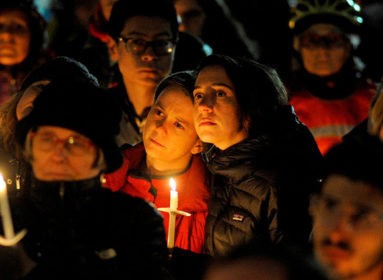
By Cindy Mindell
WEST HARTFORD – In the week following the Oct. 1 mass shooting at Umpqua Community College in Oregon, at least 79 American schools went into lockdown. This statistic was reported by The Trace, an independent, nonprofit media organization dedicated to expanding coverage of guns in the U.S. (thetrace.org). The Trace also counted 52 media reports of lockdowns at schools across the country during the week leading up to the shootings – bringing the total to at least 100 such events over a two-week period.
Some lockdowns have been prompted by actual violence – in one case, a drive-by shooting injured a man walking near a school; in another, a man carrying a whip and a horseshoe tried to break a school’s windows. Other lockdowns resulted from actual or erroneous gun sightings, or from a statement by a student that was misinterpreted as a threat to bring a gun to school.
On Oct. 9, Solomon Schechter Day School of Greater Hartford was one of at least four schools in the Northeast to experience a lockdown, brought on by yet another impetus. Two students at Hamilton College in Clinton, N.Y. reported seeing a man dressed in camouflage behind the school’s football field, with what appeared to be a gun. The college was immediately put on lockdown, with the campus emergency-alert system sending automated texts and calls about the armed threat not only to students, but to their parents. The message did not include mention of the college’s name.
One of those parents is a staff member at Schechter, who had provided the day school’s phone number to Hamilton to be used in the event of just such an emergency. But the automated call came through the central switchboard, and was immediately interpreted as describing a local threat. Schechter executed its lockdown procedure. The same call was sent to Hamilton parents working at schools in Amherst, Mass., Penfield, N.Y., and West Coventry, R.I., all of which also went into lockdown mode.
Early media reports on the situation at Schechter were not informed by the common thread emanating from Hamilton College, which caused initial concerns among some Jewish leaders that the school was the victim of an antisemitic attack; ADL Connecticut regional director Steve Ginsburg contacted the school to offer support.
Hamilton College was on lockdown for 10 minutes, until security authorities determined that the suspect was playing “Humans vs. Zombies” against another student. (The game, popular on college campuses since 2005, is now banned at Hamilton.)
The West Hartford Police Department concluded its investigation and issued a report the following week.
“We are incredibly grateful not only for the immediate response from the West Hartford Police, but also with their thorough search of our building and their absolute commitment to the safety of everyone inside,” says Schechter head of school Andrea Kasper. “The police were very satisfied with how they found Schechter during the lockdown. All the procedures were followed per their instructions, the building was quiet, and the students and teachers were safe. The faculty were well prepared to engage the students in appropriate ways during the lockdown; I credit them with how well our students managed an intense situation.”
Kasper says that she received a phone call from Hamilton College dean of students, Nancy Thompson, who apologized and made assurances that the college has taken steps to amend their emergency-alert message so that it clearly identifies the college.







 Southern New England Jewish Ledger
Southern New England Jewish Ledger














